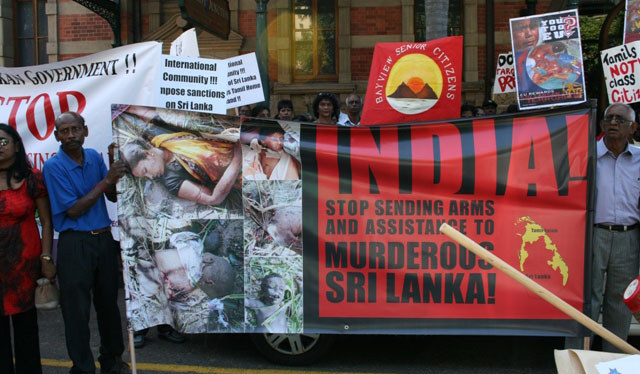Carrying the red and yellow flag, an impressive number of South Africans of Indian Origin, demonstrated outside the Indian Consulate in Durban on Thursday, March 20, to register their collective opposition to the military oppression of Tamils in Sri Lanka by the Sri Lankan Government.
They appealed to the Indian government to stop military assistance to the Government of Sri Lanka. While the Chairperson of the South African Human Rights Commission received the memorandum of the demonstrators and spoke to them, the Indian Consulate refused to accept it. Except a negligibly few Eezham Tamils, the vast majority of the demonstrators were people of Indian origin.
The demonstration was organised by the Tamil Co-ordinating Committee of South Africa to coincide with the Human rights Day in South Africa, falling on 21 March. South Africa is home to the largest number of Tamils living outside of India, more than 700 000, of which approximately 340 000 reside in KwaZulu Natal and its surrounds.
Mr D Maduray, member of TCC-SA handed a memorandum to the Chairperson of the South African Human Rights Commission, Mr Jody Kollapen. A memorandum was also to be handed over to a representative of the Indian Consulate but the Consulate refused to accept it.
Mr Maduray stated, “India as a superpower in the region has done absolutely nothing about the Sri Lankan Government withdrawing from the Ceasefire Agreement and we object to the military support that India is giving to the Sri Lankan Government to murder innocent people.” He also said “the Indian Government is demonstrating their contempt for the Tamil people by refusing to accept the memorandum.”
On acceptance of the memorandum Mr J Kollapen, chairperson of the SAHRC said “the Universal Declaration of Human rights means that human beings all over the world are regarded as equals and are entitled to enjoy simple rights like living in your country of birth, speaking your language, practising your culture and religion, but 60 years later, millions around the world do not enjoy their human rights like the people in Palestine, Iraq and Sri Lanka, particularly the Tamils.”
He also said “South Africa achieved its liberation because millions of people across the world stood with us” “This is not a Tamil issue. Our challenge in South Africa is to take this issue beyond the Tamil community.”
“The truth is we cannot be free when people in other parts of the world are not free,” he said.
South Africa was the land that moulded Gandhi to become Mahatma. While in South Africa, Gandhi was in close association with the Tamils and learnt to read and write Tamil. He always remembered with humility and thanks the contribution of South African Tamils against racism and discrimination. The life sacrifice of the young Tamil girl Va’l’liyammai during a demonstration was even recorded in his ‘My Experiments with Truth’.
"The representatives of today’s independent India behaved worse than the British Raj in their contempt to a memorandum from the people of Indian origin," said one of the demonstrators to TamilNet correspondent in Durban.
They appealed to the Indian government to stop military assistance to the Government of Sri Lanka. While the Chairperson of the South African Human Rights Commission received the memorandum of the demonstrators and spoke to them, the Indian Consulate refused to accept it. Except a negligibly few Eezham Tamils, the vast majority of the demonstrators were people of Indian origin.
 |
| South Africans of Indian origin prote-sting in Durban against India selling arms to Sri Lanka. |
Mr D Maduray, member of TCC-SA handed a memorandum to the Chairperson of the South African Human Rights Commission, Mr Jody Kollapen. A memorandum was also to be handed over to a representative of the Indian Consulate but the Consulate refused to accept it.
Mr Maduray stated, “India as a superpower in the region has done absolutely nothing about the Sri Lankan Government withdrawing from the Ceasefire Agreement and we object to the military support that India is giving to the Sri Lankan Government to murder innocent people.” He also said “the Indian Government is demonstrating their contempt for the Tamil people by refusing to accept the memorandum.”
On acceptance of the memorandum Mr J Kollapen, chairperson of the SAHRC said “the Universal Declaration of Human rights means that human beings all over the world are regarded as equals and are entitled to enjoy simple rights like living in your country of birth, speaking your language, practising your culture and religion, but 60 years later, millions around the world do not enjoy their human rights like the people in Palestine, Iraq and Sri Lanka, particularly the Tamils.”
He also said “South Africa achieved its liberation because millions of people across the world stood with us” “This is not a Tamil issue. Our challenge in South Africa is to take this issue beyond the Tamil community.”
“The truth is we cannot be free when people in other parts of the world are not free,” he said.
South Africa was the land that moulded Gandhi to become Mahatma. While in South Africa, Gandhi was in close association with the Tamils and learnt to read and write Tamil. He always remembered with humility and thanks the contribution of South African Tamils against racism and discrimination. The life sacrifice of the young Tamil girl Va’l’liyammai during a demonstration was even recorded in his ‘My Experiments with Truth’.
"The representatives of today’s independent India behaved worse than the British Raj in their contempt to a memorandum from the people of Indian origin," said one of the demonstrators to TamilNet correspondent in Durban.
